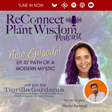
Ep.77 When to Grow Towards the Dark
Explore an intriguing aspect of plant behavior—skototropism, or the act of growing toward darkness. What can vines like Monstera teach us about our own journey toward personal growth? Just like these plants find their foundation by first growing into the dark, we too can uncover strength and clarity by embracing our shadow.
In this episode, I’ll guide you through the concept of skototropism and how venturing into your personal darkness can help you find the solid support needed for true transformation. It’s about understanding when to lean into the discomfort, finding strength in the unseen parts of yourself, and using that as a launchpad for growth into the light.
If you’re ready to uncover deeper parts of your Authentic Self, join me on this journey. Let’s grow together, even in the dark.
Topics Covered about growing towards the dark
➡️ Understanding the balance between light and dark in your life
➡️ Why facing your fears is essential for finding lasting support
➡️ Practical steps to embrace your shadow and grow with confidence
Resources Mentioned
- Plant Consciousness Commentary
- Plant Wisdom Book Club
- Befriend Your Limiting Beliefs interactive webinar
- Personal Development with me and plants
🌟Connect with nature-conscious creatives, multipotentialites, and naturentrepreneursin the premier online ecosystem that nourishes plant reawakening and community support for accelerated evolution and co-creation with otherkin. >> JOIN OUR COMMUNITY <<
☝🏽ReConnect with Plant Wisdom podcast Ancient and modern knowledge from biology to spirituality about the wondrous ways plants help you lead a Naturally Conscious life. Subscribe on your favorite podcast player.
// Let's work together: book a Discovery Call
// EcoConscious Business Partners:
Buy from Independent Book Sellers: US | UK
// Opening and Closing music by Steve Sciulli and Poinsettia from The Singing Life of Plants
// Socialize with me Facebook | Instagram | LinkedIn | Youtube



















